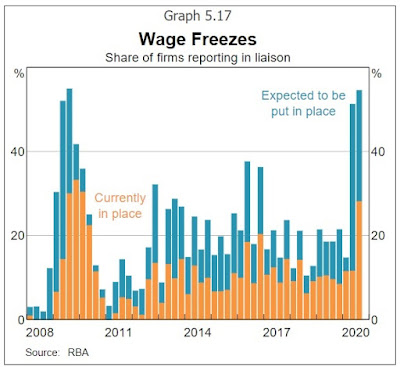Australia's Wage Price Index for the September quarter is scheduled for release by the ABS at 11:30am (AEDT) today. The shock to the economy from the Covid-19 pandemic has had significant implications for wages growth with a large share of firms responding by implementing wage freezes and some introducing temporary cuts, while deferrals of earlier agreed increases have been common in the public sector. In addition, the upheaval in the labour market caused by the pandemic and the measures implemented to contain it have driven spare capacity to very elevated levels placing downward pressure on wages growth.
As it stands | Wage Price IndexThe Wage Price Index (WPI) weakened to its slowest pace on record in the June quarter at 0.2%q/q and 1.8%Y/Y; this from Q1's outcomes of 0.5%q/q and 2.2%Y/Y. The impact of the pandemic shock on wages was initially felt much more in the private sector than in the public sector. Private sector wages growth pulled back to a 0.1% pace in Q2 from 0.5% in the previous quarter, reducing the annual pace to 1.7% from 2.2%. Public sector wages growth was unchanged in Q2 (0.6%), but the pace over the year eased to 2.1% from 2.4% on a base effect. A full review of Q2's date is available here.
As an illustration of the extent to which wages growth has pulled back across the economy, the chart below compares the annual pace of wages growth in each industry to Q2 2020 with Q2 2019. The sharpest slowdowns have come in professional and other services, with these industries likely to have been impacted by wage freezes and temporary cuts as the pandemic hit.
Market expectations | Wage Price Index
The consensus estimate according to Bloomberg is for the quarterly WPI outcome to come in at a 0.2% pace, with the range of estimates between 0.1% to 0.4%. If met, this would result in annual wages growth slowing even further to 1.5% from 1.8%.
What to watch | Wage Price Index
According to the recent RBA Statement on Monetary Policy, the central bank's liaison with industry reported a rising prevalence of firms within the program that had either or were planning on implementing wage freezes in the year ahead (see chart below). This will mainly show up in the private sector WPI. Meanwhile, we can expect public sector wages growth to slow this quarter reflecting the impact of wage deferrals and freezes, in particular affecting Commonwealth and Queensland Government workers.



